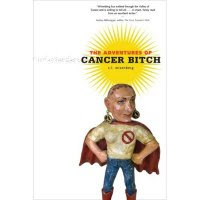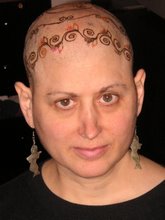
A study shows that the CA-125 blood test and ultrasounds can help diagnose ovarian cancer in post-menopausal (which is the same as menopausal) women before it has metastasized. Ovarian cancer, you may recall, is what Gilda Radner died of. It's called the whisper disease because the symptoms are so subtle: bloating, pelvic or abdominal pain, feeling full quickly, frequent urination.
The study isn't final and there's a caveat: However, the results so far leave two major issues unsettled: what the ideal method of screening is and whether finding ovarian cancer early will actually help women live longer,Katherine Hobson reports in the US News & World Report.
Women who have an average risk of getting ovarian cancer don't need to be tested, according to the American Cancer Society.
I read Gilda Radner's memoir almost 20 years ago and I remember how painful it was to read her blaming herself for the cancer--having to do with an eating disorder, I think. For all we know, she could have had a gene mutation that led to the cancer. I hate blaming the victim. For example, I read that stress and "low social support" can help ovarian and other cancers along. A study shows this. What is stress? It's the release of norepinephrine and epinephrine. Stress can be measured. The effect of stress hormones on cancer cells can be measured. I do not like this. I've been trying to remain calm for the last two weeks. I say to myself, I am calm. It works some of the time. But I get agitated easily. When I got my last mammogram, in January, I was in a waiting room for women who had had breast cancer. One woman who was my age, thin and Romanian with designer eyeglasses, said that after breast cancer she had changed her whole life--eating better, eliminating stress. Cancer as a wakeup call: You must change your life, as Rilke told us in another setting. In a museum, upon seeing a torso of Apollo. Changing is the most difficult thing a person can do. I eat more vegetables, I think; that's how I explain my lowered cholesterol. I want to be a morning person. I want not to have things bother me. I want to be calm and relaxed without taking my assortment of pills: Effexor, Buspar (generic), Wellbutrin XL. I want my asthma to go away. Yoga has helped people with asthma, my now-retired yoga teacher J used to say but I don't feel that it's changed mine much. I've been at it for maybe eight years. I want to get up with the sun and exercise every day. I want to not do things at the last minute. I want to clean my desk. I want to be organized. I want to live a long time.
The young Rilke, we are told, had writer's block, and was counseled by the much-older Rodin to go to the Paris zoo and look "until you capture the essence of the animal." Rodin's motto: travailler, toujours travailler. Work, always work. Work will save you. (That comes perilously close to Arbeit macht frei.)
We have lost much of the physicality associated with writing. Everyone sits at a computer now, not just the writer. There are no quills, no sand (to help dry the ink), no inkwells, no blotting paper, no typewriting that must be stopped at a certain hour so it won't disturb the neighboring tenants. Technology is changing, always changing, and we keep up with it or not. I want to stop it. I want to burn all the Kindles and iPods and iPhones because I don't understand them. Stop them all, like Faust wanting to burn his books. But we've come too far.
Faust doesn't look so happy:









